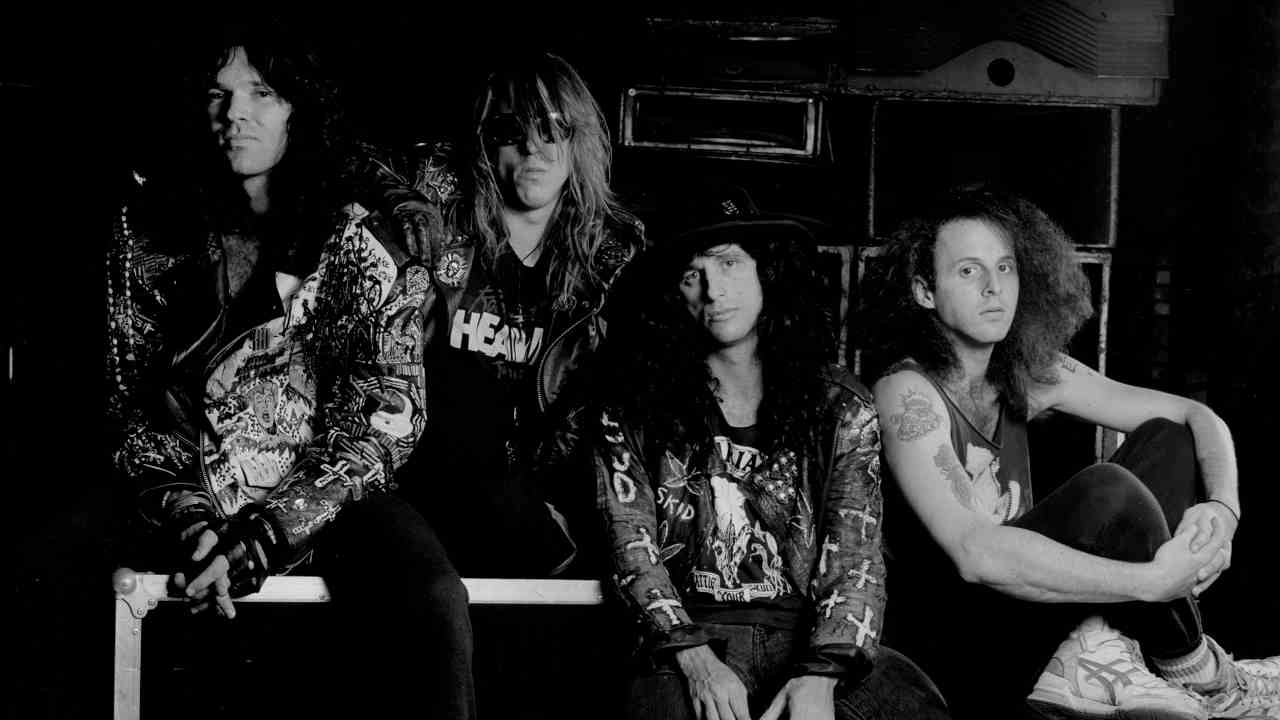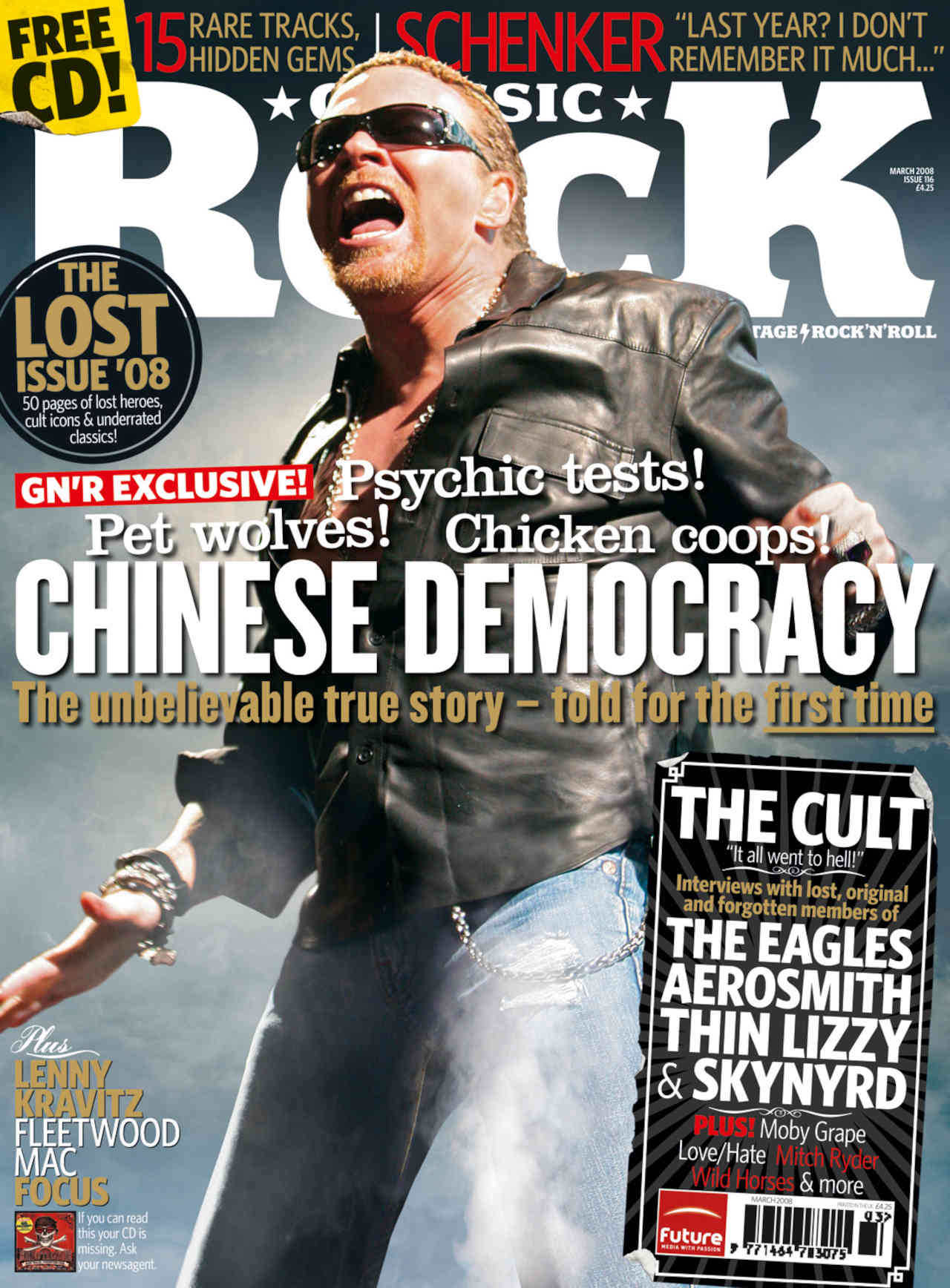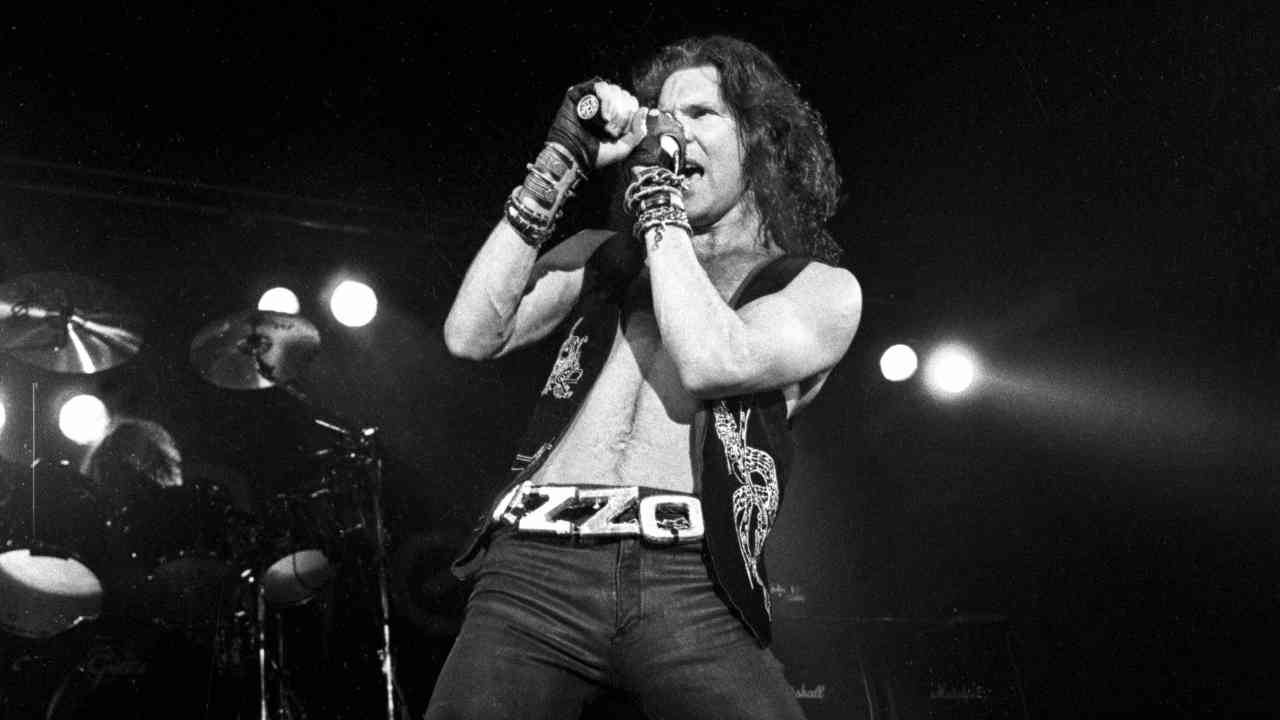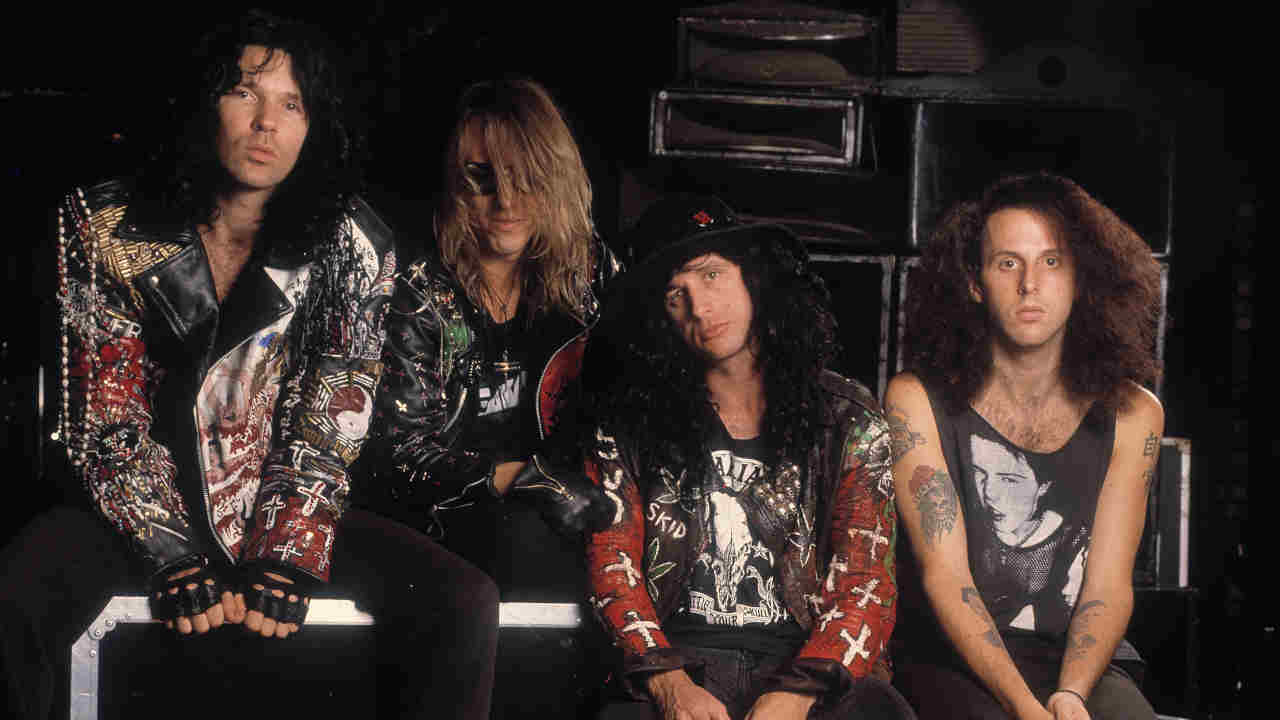Love/Hate emerged from the late 80s Sunset Strip scene in a whirlwind of noise and hype with killer debut album Blackout In The Red Room. But the public never embraced them, their record company didn’t get them and they couldn’t match the success of many of their peers. In 2008, singer Jizzy Pearl, bassist Skid Rose and drummer Joey Gold looked back on how their band snatched defeat from the jaws of victory at every turn.

Left eating the dust of many of their inferior rivals at the turn of the 1990s, Love/Hate were the group that the entire Sunset Strip hair-metal community liked to believe would never sign a record deal. Considered dumb, ugly, weird and plain untalented, in private, the California-based four-piece struggled to manage internal schism, and as resentment and insecurity welled up to boiling point they numbed the pain of rejection by partying to the max. Ultimately Love/Hate did overcome their ‘least likely’ tag, but it took guts, patience and a small mountain of drugs to do so.
Guitarist Jon E Love, bassist Skid Rose and drummer Joey Gold had played music together under the name of Data Clan long before most of the rivals that overtook them. Despite being a “new wave doom disco” band in the style of Duran Duran and Wang Chung (according to Rose), Data Clan released a self-financed four-song EP and even received interest from Atlantic and Capitol Records before a disastrous showcase concert caused talent scouts to cancel their offers.
In fact, many of the obstacles that Love/Hate eventually faced date back to Data Clan’s showcase gig, staged at enormous expense at the famous Picfair Mansion – a location for many classic silent movies – in the Hollywood Hills. Instead of inspiring a bidding war as hoped, it made the band a laughing stock.
“I’d actually experienced that showcase, but saw something in the band – they were outlaws,” says Chicago-born Jim Wilkinson, who later evolved into Jizzy Pearl, the band’s flamboyant lead singer.
Hardly blessed with communication skills of his own, Jon E Love was the group’s oddity. “Jon could say the most hateful things,” explains Jizzy. “He was an asshole. But a very talented asshole – that’s why he was in the band.”
Before adopting an image that was part glam-rock, part thrift-store, Data Clan used to wear long black coats and look like The Cure. Their music was a mix of new wave, metal, alternative, pop and even country influences, but in 1985 one album, Love by The Cult, made them start singing from the same hymn sheet.
Opening for Guns N’ Roses at an album launch party for Appetite For Destruction was another watershed moment. “They were sloppy, out of tune, drunk and too loud, but they blew our minds,” recalls Gold. “It was the most powerful thing we’d ever seen.”

Being tied to a three-year co-management deal with an individual that the band later called “an utter loser; this raging, alcoholic, gun-toting psycho” further distanced them from the breakthrough they craved. With gigs and interest in short supply, the quartet lived a hand-to-mouth existence. Skid paid his bills selling flowers by the roadside, while Pearl and Love did whatever odd jobs they could to scrape by. So the fact that Joey Gold came from well-to-do background sometimes created tension. However, there were few complaints when Gold’s parents put down the deposit for the band to share residence in a warehouse in a seedy area, two blocks away from skid row.

“That loft was our home for seven years,” whistles Skid. “Down there among the junkies, winos and prostitutes, we were going to get ourselves a music career or die trying.”
“Many of our earliest songs were tried out on the vagrants that hung around outside with their shopping carts,” recalls Joey Gold. “Amazing times.”
In early 1986, Data Clan re-named themselves after a song from their live repertoire, becoming Love/Hate. Then, during a show at the Whisky A-Go-Go, another part of the jigsaw fell into place.
“We played a version of Live Wire by Mötley Crüe and the place went wild,” recalls Skid fondly. “We thought that Mötley Crüe were idiots, and we only did it for fun. But for the very first time, arms went up into the air. After that, I felt born again. We consciously began playing a simpler brand of rock.”
With the exception of Gold, who neither drank nor smoked, Love/Hate were constantly high, causing Skid to tell an interviewer: “We are insecure about our talent – we don’t know if we have any.” However, Ratt bassist Juan Croucier agreed to produce a demo that featured several tracks that made it on to the band’s debut album.
“Juan put us on the guest list for this Ratt show in San Diego, there were probably a hundred girls in the hotel lobby,” recalls Rose. “For us, not being especially attractive or charismatic, it was an eye-opener.”
The Croucier sessions brought a chink of daylight when Love/Hate’s music was used uncredited in the soundtrack for the movie Critters, She’s An Angel then surfacing alongside tracks by the Sea Hags, Vinnie Vincent and Blondie in A Nightmare On Elm Street 4: The Dream Master.
With Jon E Love’s commitment waning, Love/Hate fired a warning shot by hiring hapless future Dio/World War III man Tracy G as a second guitarist. Fortunately the wake-up call worked, and they reverted to a quartet within a month. However, doors were still being slammed in their faces at every turn, and as aggression and drunkenness spilled over, Pearl was banned from most of the clubs on the Strip. The singer also did his best to banish himself from those at which he was still welcome.
“Jizzy did the funniest things,” snickers Skid, Pearl’s sidekick and unofficial bodyguard. “Like if we were at another band’s gig, he’d jump on stage, seize the microphone and kick into something that he wanted to sing.”
“I would indulge in all-night orgies of sex and violence; fighting, drinking and driving, and vandalising,” recalls Jizzy. “It was hard to watch all your friends getting record deals; sometimes I even bit people on the street.”
On one fateful occasion when the singer slipped while having a piss from a building top, the sober Gold was on hand to save his life. “I held on to Jizzy’s shirt and prevented him from falling to the ground from six storeys up,” he recalls.
It took a disastrous opening slot for LA Guns to make Jim Wilkinson look in the mirror and realise he needed to become his alter ego, Jizzy Pearl. “The show was videoed and I was this fucked-up, unfunny, off-key idiot,” he recalls with horror. “Watching it changed my life.”
As the “sober and presentable guy”, Joey Gold began taking the band’s latest demo to the labels, and before too long there was actually a buzz about Love/Hate. Then following a gig at the Whisky, Columbia offered a deal. After repaying debts, each member pocketed $20,000 of a $100,000 advance. “Jon still bitched, saying how [parent company] Sony had ‘fucked us’ – this was a true weirdo,” marvels Jizzy.

Overwhelmed by good fortune, several band members flew to Hawaii to dine on lobster, drink expensive wine and contemplate new life as rock stars. “We just basked in the glow of our success,” recalls Jizzy. “I could have stayed on that beach forever.”
Having helmed records by Cheap Trick, the Crüe and Ted Nugent, Tom Werman was paid $75,000 by Columbia to oversee Love/Hate’s debut, but according to Jizzy only blew the band’s “perception of what a producer does; his engineers did most of the real work”.
Sporting a day-glo cartoon of the band drawn by Skid as its cover, Black Out In The Red Room arrived in March 1990, its paeans to booze, drugs and strumpets – and indeed boozy, drugged-up strumpets – effortlessly tapping into slacker culture. When the band broke out of LA to tour, they used a 30-foot pot leaf as a backdrop, and the show commenced with a deranged Skid doing a war dance and brandishing a cross made from empty Budweiser cans.
“We were pro-drugs, but it was more of a philosophical thing,” theorises Rose. “Everyone knows that drunks always end up as losers, though as readers of [barfly author Charles] Bukowski, we had a romantic vision of it all.”
Skid Rose insists that Love/Hate themselves came up with the slogan of “the stoopidest band in the world”, but somehow it stuck. “We were a lot smarter than we let on,” he winks. “Next to the dumbness of Tommy Lee and the metal crowd, we were geniuses.”
Almost overnight, Love/Hate ascended from local lepers to Sunset Strip superstars. Opening for Dio, their gutter-rock went down like a cup of cold piss, so Jizzy Pearl made up for lost time. “Stripper shows, lesbians, multiple partners, ménage à trois or four or five, it was all there for the taking,” he relates excitedly. “I revelled in wielding the hammer of the gods.”
Touring with AC/DC, often to 20,000 fans, was more satisfying. On the crest of a wave, Love/Hate played two British tours during 1990 alone and returned to London’s Marquee on New Year’s Eve.
Already remote, Jon E Love was forced further out into the cold to use his time for solitary, chemically inclined purposes. But for Skid Rose the problems ran deeper. “Money and success ruined Love/Hate,” he believes. “Being destitute, desperate and having no hope beyond tomorrow was what fuelled us.”
Love/Hate eventually sold 200,000 copies of Black Out In The Red Room – which was hardly the platinum status that Columbia expected. Two years later, Wasted In America fared less well, and with album number three they moved to RCA for 1993’s Let’s Rumble, which introduced new guitarist Darren Householder.
“Jon was so wasted back then,” sighs Skid, “he’d probably have died if he’d stayed with the band.”
With other members dropping out, Pearl went on to front various incarnations of the band, then joining Ratt, LA Guns and Adler’s Appetite. But save for one minor glitch, Love/Hate are completely comfortable with their legacy.
“Bands that sold 10 times what we did back then aren’t remembered anywhere near as fondly,” points out Skid. “So much music from that era still reeks of spandex and codpieces. For all our goofiness, that’s not true of us.”
But ask the bassist, who subsequently became involved in the internet boom becoming web-developer, describing himself as “middle-class and mainstream”, about the Budweiser cross, and his face turns ashen. “That’s the only thing from Love/Hate I’m ashamed of. When the original band got back together for a reunion in February 2007, I had to hide out from my children in my office, emptying out cans of beer to make this Goddamn cross.”
Originally published in Classic Rock issue 116, February 2008



